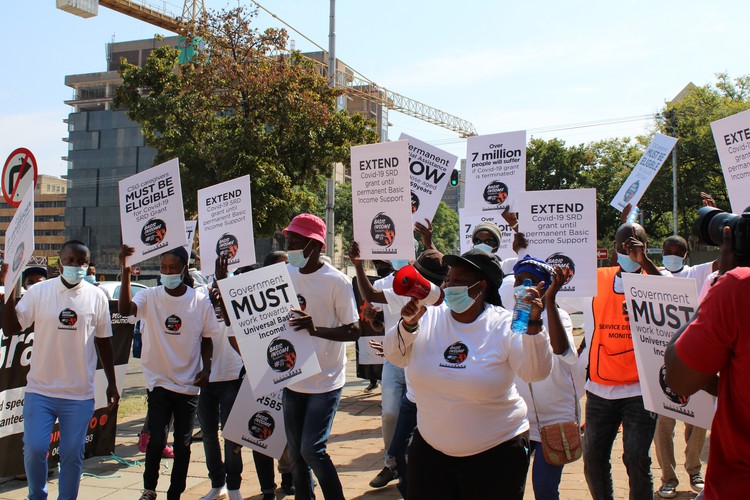
29 October 2024
Activists picket outside the National Department of Social Development offices in Pretoria in April 2021 calling for the extension and increase of the Social Relief of Distress Grant. Archive photo: Masego Mafata
The Social Relief of Distress Grant (SRD) is broken and needs to be fixed urgently. As many as eight million people are being denied the grant because of exclusionary barriers, including the fact that it can only be applied for on-line and that child support grants are considered “income”, pushing many above the means threshold. This was the argument made by advocate Jason Brickhill from the Socio-Economic Rights Institute of South Africa (SERI), arguing on behalf of the Institute of Economic Justice (IEJ) for broad changes to regulations.
Argument commenced on Tuesday before Pretoria High Court Judge Leonard Twala and is expected to continue on Wednesday with opposing arguments from the National Treasury, the Department of Social Development and the South African Social Security Agency (SASSA).
About eight million South Africans currently get the R370 grant (recently increased from R350). But, says the IEJ, they are often not paid.
And there are another estimated eight million South Africans living below the R624-a-month means threshold, who should qualify.
The grant was initially introduced during the Covid pandemic under disaster regulations. But it was later added to the list of grants under the Social Assistance Act. This meant, Brickhill argued, that it was not a “temporary” grant, as claimed by the respondents, and the recent R20 increase was proof of this.
He said the respondents had put out many “red herrings”.
The IEJ was not asking for the court to determine the rand value of the grant, how much the government should budget for it, or whether government should introduce a universal income grant.
“We characterise our relief as modest. We want an order striking down those regulations which arbitrarily exclude people. We are asking the court to direct the department to develop a plan to remedy the regression (in the relief the grant provides to poor people). Regarding the systematic non-payment, we seek a structural interdict which invites the department and SASSA to take seriously that people are not being paid and to identify suitable solutions.”
He said statistics from 2015 showed that 25% of South Africans were living below the food poverty line “and there was no indication that this has changed”.
A more recent study in 2023 found that more than 20% of South Africans routinely sent a family member to beg for food – “that’s one in five” Brickhill said.
While Treasury, in its papers, had admitted this, the department had pleaded “no knowledge” of this, Brickhill said.
“This case is very much about the right to food. In 2021, as many as 2.8-million people were lifted up out of the food poverty line because of it [SRD grant].
“Reports indicate that it improves life prospects, job seeking, educational opportunities, empowerment of women, with some starting small businesses. It has boosted township and rural economies.
“But the exclusion of people who should be receiving it is unlawful and allowing the grant to stagnate in the last four years, has reduced its benefits in ways that are unconstitutional.”
IEJ is directly challenging the legality of at least six regulations.
Among them is the on-line only application process.
“We accept its benefits and reach. The problem is the people who are excluded because of lack of access to digital technology, limited internet connectivity and lack of digital literacy,” Brickfield said.
In response, the department and SASA had argued that the online system was easy, people could share phones and apply from the “comfort of their homes”.
“These submissions are out of touch with the realities of the beneficiaries of the grant,” Brickhill said.
Another issue was the “unduly broad” definition of income and financial support which provided that applicants must receive less than R624 a month in order to qualify.
A major problem was the inclusion of the child support grant in this amount, although it now seemed that both Treasury and the department conceded that this was wrong and needed to change.
“The issue is with the interpretation that income and financial support means any money received for any purpose.
“We propose that income should be defined as money received on a regular basis from formal or informal employment, such as wages, earnings from informal trade, business activities and investment,” Brickhill said.
“Financial support should be defined as regular payments which benefit the recipient that do not constitute income and which the recipient has a legal right to receive. So that would include, say spousal maintenance, but would exclude the child support grant, which is given for the child.”
Turning to issues with the online form, Brickhill said two “egregious questions” should be removed.
One asked applicants how they survived without the R350 grant. But there was no an option to say, “I don’t, I starve”.
“It traps an applicant into an answer that will exclude them [from eligibility for the grant]. And the data shows that 25% of rejections are due to self exclusionary responses.”
The use of databases was also problematic because they were unreliable. For example the UIF database could reflect a person as having received benefits in the past, and the NSFAS database might reflect student funding, when it had, in fact, been rejected.
“They [the respondents] cannot wrongly reject millions of people by saying it’s their [the grant applicants] responsibility to make sure those databases are updated.”